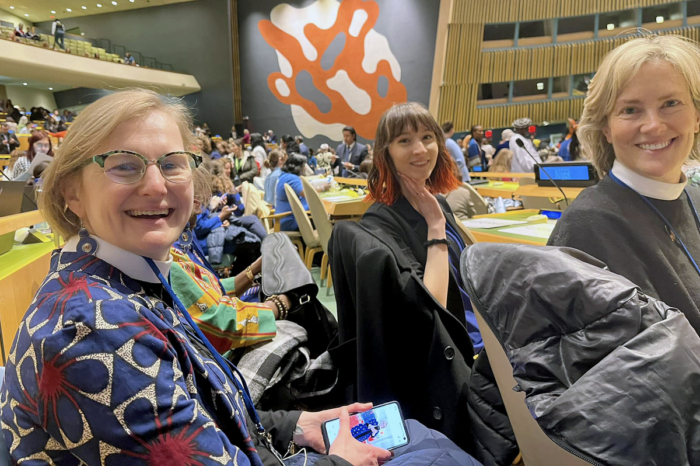Episcopal delegates to UN women’s conference see challenges, find hope in exploring a digital world for women and girlsPosted Mar 15, 2023 |
|

Episcopal delegates to the 67th United Nations Commission on the Status of Women, from left, the Rev. Lilo Rivera, Ailysh Cooper and the Rev. Elizabeth Garnsey, were among the 1,800 people in the United Nations General Assembly Hall on March 8 to mark International Women’s Day. Photo: Lynnaia Main
[Episcopal News Service] Episcopal delegates to the 67th United Nations Commission on the Status of Women spent a busy first week in official meetings, adjacent events and daily worship during the commission’s first in-person meeting since 2019. Activities and delegates’ work are centered on the theme of the March 6-17 commission: innovation and technological change, and education in the digital age for achieving gender equality and the empowerment of all women and girls.
Eight of the nine delegates are in New York for the event – the other is attending online. Five delegates are participating in UNCSW for the first time; they are representing Presiding Bishop Michael Curry, and part of their work is to advocate for priorities he outlined in an official statement:
- Extend accessibility to all, and prioritize marginalized women and girls.
- Ensure human rights protections, safety and security.
- Accelerate gender equality education for all.
Three delegates are teachers, “the first time we’ve had so many teachers,” Lynnaia Main, The Episcopal Church’s representative to the United Nations, told Episcopal News Service. They all have experience with online education, and Main said that should help them, as well other delegates – some of whom are less tech-savvy – better engage with the event’s emphasis on how education and technology can aid gender equality.
While every UNCSW meeting deals with topics that are important to women and girls across the world, Main called this year’s event a “high-stakes conference,” since it is taking place as the U.N. considers its first Global Digital Compact, which will “outline shared principles for an open, free and secure digital future for all.” The compact will be adopted in September. The lead time, Main said, gives UNCSW delegates the chance to provide input, through their organizations, on what it should include before it is adopted this fall. “It is quite amazing to realize that we are dealing with uncharted territory,” she added.
The compact’s importance was made clear to the Rev. Elizabeth Garnsey in what she has learned so far. “I’m surprised by how consistently, across so many large and small nations of the world, that women and girls are at a disadvantage in their freedom to access the basic education and skills needed to survive and thrive in today’s digital world,” Garnsey, who serves as a priest in the Episcopal Church in Connecticut, told ENS by email. She also noted the disparity in the way girls and boys worldwide are treated online. “At least one in three girls report they have experienced some form of online harassment or abuse, compared to less than one in 10 boys,” she said.
The importance of being with and learning from others
In response to questions from ENS about their work, several delegates noted the power of being at the U.N. on International Women’s Day, March 8, when 1,800 people gathered for events in the General Assembly Hall, many wearing blue, the movement’s signature color.
Others described a sense of optimism about what they have experienced. “There is so much civility, negotiation, respect and good-natured interactions in the United Nations,” Ellen Lindeen, of the Diocese of Chicago, said, while noting the heartbreak of hearing from women from Ukraine. The commitment of people from all over the world to “peaceful problem-solving” left the Rev. Lilo Carr Rivera, a priest in the Diocese of Long Island, feeling hopeful.
Ruth McLain, who is from the Diocese of West Tennessee, told ENS that while the activities taking place in New York are important, sharing what they learn when they return home is no less so. Main echoed that need, noting that delegates have begun talking about how to share what they have learned and experienced, not only with their parishes, schools and communities, but across the wider Episcopal Church.
More information about the work of the delegation is on the UNCSW page on The Episcopal Church’s website and in a fact sheet about the Episcopal presence at the 67th commission. Follow along @EpiscopalUN on Facebook and Twitter.
– Melodie Woerman is a freelance writer and the former director of communications for the Episcopal Diocese of Kansas.

Social Menu